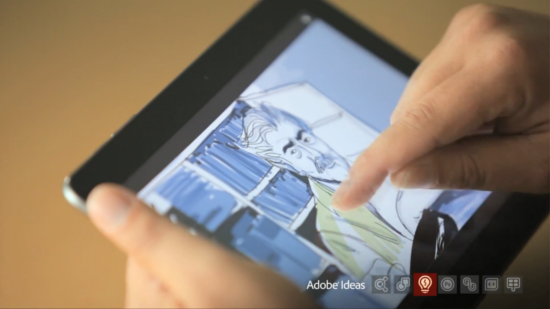
Are you one of the many that believe tablets are a lost cause? A waste of time? Adobe has set out to prove you wrong. They believe tablets are perfect for on the go content creation.
Tablets are admittedly underpowered and lacking some in terms of functionality. But over the next few years, they are slated to change vastly and intertwine with the thriving PC industry. As we lead more busy and "on the go" lifestyles, desktop PCs and clunky laptops become more inconvenient. Tablets are the answer to that problem, but only as mobile and desktop operating systems merge and more functionality is brought to mobile. Tablets will grow from primarily media consumption devices to content creation tools.
A few weeks back, I touched on the future of Android and what Google will do as platforms like iOS and OS X merge and Windows 8 (some strange fusion of Windows Phone and Windows 7) arrives. Unlike Apple and Microsoft, Google does not have a proprietary desktop operating system. But they may not need it, if more mobile developers follow Adobe's lead.
Seven months after showing off their concept Photoshop iPad app at Photoshop World, Adobe has finally announced their Adobe Touch Apps Family for iOS and Android. Photoshop Touch, just one of the six apps in the suite and likely to be the most popular of the bunch, is a tablet-based version of Adobe's ever-popular photo editing software. Unlike current mobile applications, Photoshop Touch touts many of the features as seen in Adobe's PC and Mac offerings. It boasts photo editing features like layers, selection tools, adjustments, effects and more. It even features Photoshops popular Refine Edge feature. In other words, this is arguably the most robust software available to mobile users we've seen yet. The Adobe Touch Apps Family will launch in the near future for $9.99 a pop. Not bad, considering the price of their PC counterparts.
While Adobe Touch Apps Family certainly show promise for the capabilities of mobile applications and how much more feature-packed they can be with a little more elbow grease and effort, these are hardly the only features needed on a tablet to make it a viable content creation tool for the masses. Not everyone needs or wants a vector graphics app or Photoshop.
Office suite providers like Quickoffice, DocsToGo and others have been slowly but surely adding more PC-like capabilities to their mobile apps. That said, they have a long way to go before they challenge the likes of Microsoft Office or iWork. We can only hope they become more functional as more people – especially students – take to tablets for their personal computing.
The area where tablets arguably need the most work, however, is in the browser department. Most people wouldn't consider the browser as a vital tool when it comes to content creation; but for someone in my profession, it is everything. I have tried to work from nearly every tablet and mobile platform out there. It simply does not work as most mobile browsers do not support all web standards and cannot handle some of the more simple things. I have typed almost every article in its entirety from a tablet since I bought my Bluetooth keyboard for the Galaxy Tab. But after I'm done writing, I have to move to a PC to finish the task. This is neither appealing or efficient, but I do it anyway.
The PlayBook's WebKit browser is easily the most advanced of the bunch, yet I still cannot work with that browser either. Safari on iOS and Android's stock Honeycomb browser need quite a bit of work, too. According to some information found in the Chromium revision log, Google will soon be taking the next step in mobile browsing. Apparently, Google's Chrome browser will be making its way to Android sometime in the near future, with almost all of the desktop version's features in tow. This would easily allow me to do all of my work from a tablet.
As it stands, tablets are perfect for content creation. The hardware can definitely handle the task and they offer a more hands-on experience, but the software just isn't there yet. As more companies like Adobe realize the true potential of those PC-like slabs, tablets will become more than just media consumption devices. They will become business tools and a must-have companion for school.
I'm always looking for more ways I can fit my tablet into my life. Maybe it's just to prove those who say they're worthless wrong. Nonetheless, I will certainly be buying Photoshop Touch when it officially launches, and I will be keeping my eyes peeled for the full version of Chrome for Android.
What say you, folks? Do you use your tablet for content creation? Or is it just a media consumption device? If more applications like Photoshop Touch and the full Chrome browser make it to the tablet world, will tablets become more viable devices?
Image via Adobe Photoshop Channel